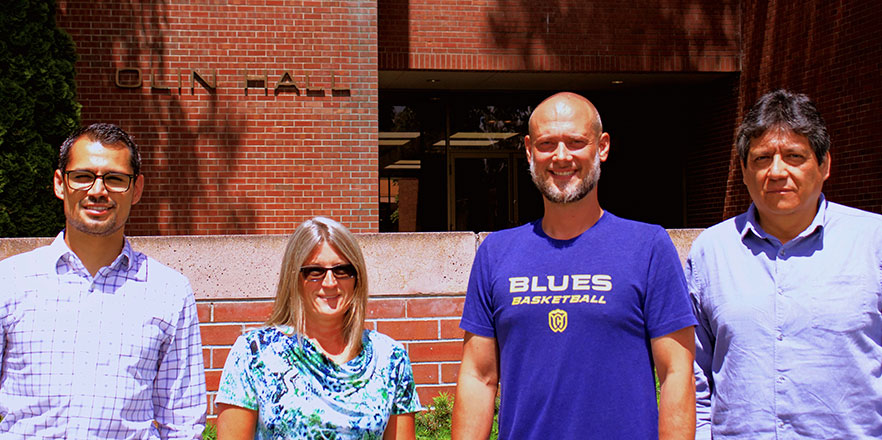Renamed Department of Hispanic Studies Emphasizes Culture, Context
By Whitney Rich

For the 2019-2020 academic year, the Department of Hispanic Studies, formerly known as Spanish, has a new name, revamped existing courses and several newly created courses. The name change was many years in the making, but it was an external review conducted in 2018 that proved to be the catalyst for the changes.
"The external review tasks us to look holistically at the curricular offerings, the structure of the department, our department needs, the kind of program we offer for students, and the ways that our name communicates the things that we do" said Aaron Aguilar-Ramirez '12, assistant professor of Hispanic Studies and the newest member of the department.
The four professors found that the name "Spanish" didn't communicate the offerings of the department, which not only teaches the Spanish language, but also teaches the analysis of literature, culture, discourse, and film and visual media.
"I think that the title ‘Hispanic Studies' helps students think of the major in their own way," said Assistant Professor Carlos Vargas-Salgado. "They are obviously intended to master the language, but they also get a full understanding of the cultural, historical and geopolitical context connected with the Hispanic culture in the United States."
The Spanish language is spoken officially in 21 countries, by over 400 million people. It is one of the six official languages of the United Nations and the second most spoken language in the world. Spanish typically refers to language and Spain, while Hispanic, is an adjectival form of the word Spanish, without the geographical connotation.
"It suggests that it is sort of embracing and encompassing all Hispanic communities in the world, that it is interdisciplinary in its scope and its method," Aguilar-Ramirez said. "It opens up a whole lot of problems and questions that we actually address in a lot of our courses: Questions of identity, questions of ethnicity, questions of belonging, the very nature of Spanish as a colonial and colonized language in the United States. We hope that in our courses, students can grapple with all of the questions the terminology 'Hispanic studies' brings up."
The name change was officially announced April 23, 2019, at a department-wide celebration for International Spanish Day. The celebration allowed current and prospective majors and international students to discuss the change.
"The reception by students has been incredibly supportive and generated a lot of excitement," said Professor Janis Be. "It has also been brought to my attention the numerous ways that students have found the name change personally affirming."
The name change has already helped students and faculty have a better understanding of the program. Vargas-Salgado was approached by a transfer student from Mexico who was surprised that many of the topics offered at Whitman were not even taught in his own country.
"They are seeing the classes in a completely different perspective, that they have the content that they want to learn, and the language is just a medium that they use for continuing this conversation," Vargas-Salgado said.
The department's evolution has prompted many of the professors to add new courses or modify existing classes. Associate Professor Nico Parmley added a 20th century immigration policy component to his class, "Tolerance, Culture and Violence: How Muslims, Christians and Jews Shaped the Iberian Peninsula."
"It's these kinds of conversations that force me to reevaluate how I even approach medieval Spain and how I teach that to be more relevant to our student body and community," he said.
New courses for the 2019-2020 school year include Spanglish, taught spring semester by Aguilar-Ramirez, Contemporary Latin American Cinema taught by Be and Spanish for Heritage Speakers, which will be taught by visiting Professor Lena Retamoso-Urbano.
"These are courses that we've been wanting to teach for a long time. There is a lot of interest and enthusiasm not just on our part, but from the students," Be said. She will be teaching a new course on Contemporary Latin American Cinema this fall. Taught in English, this class invites students from across campus and from their very first semester to explore Hispanic Studies at Whitman.
The program anticipates continued excitement, discovery and visibility sparked by the changes. The faculty members also are looking at ways to build closer relationships with on- and off-campus organizations, the Spanish-language interest house La Casa Hispana, and the Walla Walla community.